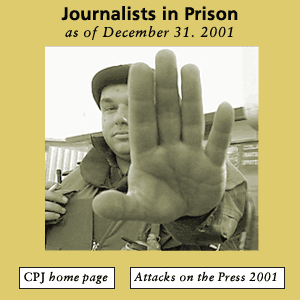Attacks on the Press 2001: Introduction
IN THE WAKE of September 11, 2001, journalists around the world faced a press freedom crisis that was truly global in scope. In the first days and weeks after the terrorist attacks on New York City and Washington, D.C., governments across the globe–in China, Benin, the Palestinian Authority Territories, and the United States–took actions to…
Attacks on the Press 2001: Asia Analysis
Journalists across Asia faced extraordinary pressures in 2001. Risks included reporting on war and insurgency, covering crime and corruption, or simply expressing a dissenting view in an authoritarian state. CPJ’s two most striking indices of press freedom are the annual toll of journalists killed around the world and our list of journalists imprisoned at the…
Attacks on the Press 2001: Nepal
A year of extraordinary violence and political upheaval severely strained Nepal’s young democracy and posed profound challenges for the country’s media. Scores of journalists were detained after the declaration of emergency regulations in November, and 17 remained in prison at year’s end. The first major crisis for the press in 2001 began on June 1,…

Attacks on the Press 2001: Journalists in Prison
There were 118 journalists in prison around the world at the end of 2001 who were jailed for practicing their profession. The number is up significantly from the previous year, when 81 journalists were in jail, and represents a return to the level of 1998, when 118 were also imprisoned.
Editor arrested
New York, March 19, 2002—The Committee to Protect Journalists (CPJ) is deeply concerned about the recent detention of Shyam Shrestha, editor of the leftist monthly Mulyankan. On March 16, authorities detained Shrestha at the Tribhuvan International Airport in Kathmandu. Shrestha was on his way to New Delhi, India, to take part in a conference on…
Nepal: Authorities wield emergency regulations in press crackdown
Your Excellency: The Committee to Protect Journalists (CPJ) is deeply concerned about your government’s ongoing efforts to stifle the Nepalese press by using emergency regulations that give authorities broad power to arrest anyone suspected of supporting the rebel Maoist movement.
Maoist revolt sparks crackdown on press
Your Excellency: The Committee to Protect Journalists (CPJ) is extremely concerned about press freedom violations in Nepal during the recently declared State of Emergency. On November 26, King Gyanendra declared a State of Emergency throughout the country in response to an upsurge of violence between Maoist rebels and government security forces that killed at least 100 people over the weekend.
CPJ welcomes journalists’ release, but says sedition charges should be dropped
New York, June 18, 2001 — Three journalists with the Nepali-language daily Kantipur, Yubaraj Ghimire, Kailash Shirohiya, and Binod Raj Gyawali, were released from jail on June 15. They face a trial next month on sedition charges stemming from an opinion piece that suggested a conspiracy behind the assassination of Nepal’s royal family. “We are…
Newspaper executives arrested in aftermath of palace killings
New York, June 6, 2001 – The Committee to Protect Journalists (CPJ) condemned today’s arrest of three leading Nepalese journalists and called for their immediate and unconditional release. Yubaraj Ghimere, editor of the Nepali-language daily Kantipur, Kailash Shirohiya, managing director of Kantipur and its sister English-language publication the Kathmandu Post, and Binod Raj Gyawali, director…